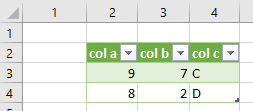Example with List.Select
The «power» of an
each expression shines for example when using together with List.Select. List.Select is a function that finds elements of a list that possess a certain characteristics. This characteristics is evaluated with the second parameter of List.Select which expects a function with one parameter. If this function returns true, the element is retained in the resulting list, otherwise, it is discarded: let
L = {
[ a = 1, b = 7, c = "A" ],
[ a = 3, b = 6, c = "B" ],
[ a = 9, b = 7, c = "C" ],
[ a = 8, b = 2, c = "D" ],
[ a = 2, b = 4, c = "E" ],
[ a = 4, b = 5, c = "F" ]
},
a_gt_b = List.Select(
L,
each [a] > [b]
)
in
Table.FromList(
a_gt_b,
Record.FieldValues, // Apply this function on each element in a_gt_b: it turns the record into a list
{ "col a", "col b", "col c" } // Name the columns
)
Github repository about-Power-Query-Formula-M, path: /language/expressions/each/List.Select.M
